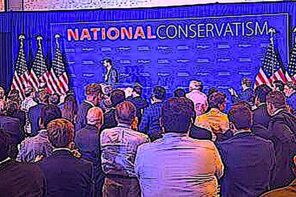Upon the recent death of the conservative British historian Paul Johnson, the right-wing journal Public Discourse praised Johnson as the “historian of human dignity.” Another recent piece in the Washington Post by Justin Dyer—executive director of the conservative Civitas Institute at the University of Texas—emphasized that the American nation’s founders believed that “concepts of fundamental human dignity and moral equality are rooted, ultimately, in the book of Genesis.”
We might contrast the vaguely narcotic, soporific impact of these recent mentions of human dignity to a famous article published in 2008 by Harvard University’s Steven Pinker, entitled “The Stupidity of Dignity.” Pinker alerts us that much lies beneath the surface use of this otherwise anodyne term.
What does “human dignity” mean? As always, Donald Trump rips the façade away for us. In September 2017, Trump delivered a stemwinder of a speech before the United Nations General Assembly in New York City. This address, authored by the architect of Trump’s ill-fated “Muslim Ban,” Stephen Miller, provided Trump with the opportunity to strut and swagger before the entire world. Trump invoked the term “dignity” three separate times, pairing it with the terms human nature, rule of law, freedom, and peace, thus making it a major theme.
The 1948 Universal Declaration of Human Rights proclaimed that “recognition of the inherent dignity and of the equal and inalienable rights of all members of the human family is the foundation of freedom, justice and peace in the world.” No doubt, Stephen Miller’s language was intended, generally speaking, to invoke these lofty goals. However, Miller also smuggled into Trump’s UN address a more politically specific meaning of “human dignity,” derived from Catholic natural law moral philosophy, and more directly aligned with the ways Paul Johnson and Justin Dyer made use of the term.
To flesh out this meaning, let’s consider Dignity Health, a Catholic hospital system which in 2019 merged with Catholic Health Initiatives to become CommonSpirit Health, the 5th-largest (and the 2nd-largest non-profit) hospital system in the United States. Here’s how Dignity Health explains its adoption of the term “dignity” to represent its identity to the world. “Holding the value of dignity means we show respect for persons, not for anything they do or any rank they hold, but because they reflect the face of God.”
Dignity Health possesses deep and intricate ties to the Catholic Church, along with its institutions, theology, and ethics. Dignity’s Vice-President for Ethics and Justice Education Carol Bayley said, “We have our feet in Catholic mud, there is no denying it.” The hospital considers itself a ministry and views its mission as sacred. Hence, the concept of dignity is freighted with specific Catholic inflections of the term.
For Dignity Health, respecting dignity means working toward the “common good.” On the surface it means making no distinctions with regard to age, gender identity, sexual orientation, religion, culture, race, and ethnicity. At bottom, however, dignity conceived as respect of humans as the “face of God” (imago Dei) is about reverence for the “sanctity of human life,” from conception to natural death.
These values conform closely to the precepts of Thomist natural law moral philosophy and to the spirit of the 1948 Universal Declaration of Human Rights. Ironically, however, the belief that human dignity is contingent upon some abstract reflection of “the face” of God has led us into dark places that subvert these universal values.
For instance, one might be forgiven for noting that the commitment of Dignity Health to the “sanctity of human life,” based upon the notion that humans are created in the image of God, is most evident at its nascent and terminal stages. Governed by the Ethical and Religious Directives for Catholic Health Services (which itself refers to “dignity” on more than two dozen occasions), Dignity Health does not perform “direct abortion”; it does not support “reproductive technologies” that occur outside a woman’s body, including in-vitro fertilization (IVF); and it does not participate in physician-assisted suicide for the pain-wracked or terminally ill.
The Ethical Directives remind us that the Catholic Church views each of these practices as “intrinsically evil.” From this perspective, the hospital system’s notion of human dignity is both generally about the “sanctity of human life” and specifically about a rooted, restrictive, and inviolable vision of religious, sexual and reproductive morality.
The turbulent bioethics debates of the first decade of the 21st century—which provide the context for the Steven Pinker essay on the stupidity of dignity—were deemed significant enough to produce a 577-page collection of essays about dignity. In this volume, an illustrious collegium of mostly conservative Catholic and Jewish physicians, scientists, and philosophers—including Richard John Neuhaus, Robert P. George, and David Gelernter— anchor human dignity to Judeo-Christian religious foundations. As Neuhaus writes, “The concept of the dignity of the human person [is] a form of understanding that is carefully reasoned, frankly moral and unapologetically acknowledged as religious.”
With notable vehemence, he also anchors the absence of human dignity to Enlightenment hubris, secular liberalism, and what Neuhaus termed “methodological atheism.” According to Neuhaus, “Only those arguments are to be admitted to public deliberation that proceed as if God does not exist. This is a non-rational prejudice in which the great majority of Americans do not acquiesce.”
Fifteen years later, dignity continues to be a signifier of morally earnest intent. The peddling of the term is by no means confined to religious conservatives. Dignity is a term also especially prevalent within the international LBGTQ rights community, an indication of its protean hold upon the moral imagination. And, in a recent column, Jamelle Bouie, writing with incandescent clarity, emphasizes the centrality of human dignity to the democratic vision of Frederick Douglass.
However its ubiquity within the Catechism of the Catholic Church and in Humanae Dignitatis, the 1965 papal encyclical establishing religious freedom as the preeminent human right, confirms that “human dignity” possesses uniquely incantatory and “self-evident” meaning for conservative Catholics.
In moral terms, Richard Neuhaus wrote, “the dignity of the human person is affirmed most importantly not in the assertion of one’s autonomy but in the protection of others who are most subject to having their dignity violated.” Fair enough, one might say. In practice, however, religious conservatives almost exclusively apply “the dignity of the human person” to culture war shibboleths of the Catholic Church: the thou shalts and thou shalt nots of abortion, contraception, surrogacy, gender, sexuality, marriage, parental rights, vaccines, and assisted suicide.
These issues all fall under the umbrella term, the “natural family,” the reference to a family unit consisting of a married man and woman and their biological children, conceived via “natural” (or non-contraceptive) birth planning methods. The idea of the natural family is used to define a normative family structure and to exclude as immoral and intrinsically “disordered” any behavior that deviates from this structure.
When Hungary’s prime minister Victor Orbán spoke at CPAC’s April 2022 conference in Dallas, religious conservatives in the United States wildly embraced him as the prophetic herald of a post-Enlightenment model of a spiritually-pure cultural polity. “What I see in Orbán,” raved conservative Christian columnist, Rod Dreher, “is one of the few major politicians in the West who seems to understand the importance of Christianity, and the importance of culture, and who is willing to defend these things against a very rich and powerful international establishment.”
Dreher, unsurprisingly, now lives and works in Hungary.
What has this defense of Christian culture entailed? Since 2011, Orbán’s Fidesz Party has spurned the European Union’s legal definition of human dignity, reengineering and reducing its mandate to ethnic, religious, and family values rooted in spurious, half-invented, ethno-nationalist traditions. The stated purpose of the Fundamental Law of Hungary has been to exclude, marginalize, wall off, and criminalize “alien” and “contaminating” populations, ranging from Muslim migrant refugees and asylum seekers to stateless Romani people, urban homeless, and members of the LGBTQ community.
The Fundamental Law, quite systematically and intentionally, does not assign dignity to all who reflect the face of God. It favors the fetus over the mother bearing it; it favors those aligned with Fidesz and punishes those who are not; and it favors Catholics over non-believers and followers of other non-Christian faiths.
As scholars have pointed out, this constitution, which legally identifies the nation as an “intellectual and spiritual” community, and which declares the “natural family” to be “the most important framework of our coexistence,” isn’t modeled on ancient traditions. It is a descendant of the East-Central European nationalist ideas and movements from the last two centuries. Indeed, under these conditions, during World War II, the Hungarian regime, in a matter of months, delivered nearly 450,000 Jewish Hungarians to Auschwitz, more than half of the Hungarian Jewish population.
When amoral Donald Trump unwittingly deployed his various uses of the term human dignity in his UN speech, he was serving the entirely witting and morally insistent aims of others. The cadre of illiberal Catholic conservatives in the United States, and in European Catholic nations such as Hungary, Poland, Italy, and Spain, certainly knew what ideologies and programs Trump’s ideal of human dignity was underwriting. In this sense, human dignity—like other terms of art in Catholic natural law—is a trojan horse, the means by which a church might absorb its state and a religion might absorb its politics.





